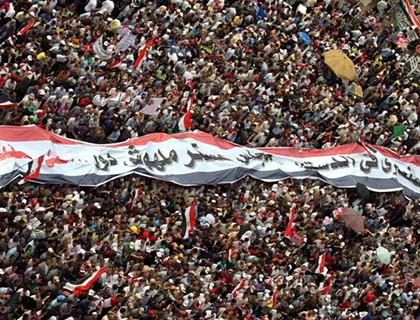The Islamist President of Egypt, Mr. Mohammad Mursi, rescinded his decree of ensuring him sweeping power in the country's political establishment on Sunday. Definitely the measure is a clear retreat and aimed to mollify his oppositions, but the situation has still remained tense.
During past few weeks, the country was boiling in intense anti-government demonstrations. Tens of thousands of people regularly marched into streets, voicing out their anger what they call as efforts by President Mursi to tighten his grasp over the political power.
It becomes months that part of Egyptians feel that President Mursi is not going to realize promises made during the first free presidential election after the collapse of former President Hosni Mubarak's regime, but after his promulgated decree on November 22 of assuming sweeping power people flooded to Tahrir Square, somehow, similar to the series ofdemonstration which ended the regime of President Mobarak.
They were calling on President to step down and rescind his decree. In order to appease oppositions, he tried all political initiatives to bring oppositions on negotiating table and mollify them through promises, but bluntly failed.
Seemingly, opposition political parties have learned from their major losses in the past. They could not make any visible civil or political moves in the country. Muslim Brotherhood could easily overtake Presidential election and send their nominee, President Muris, to palace without major threat from opposition parties.
The only political party that appeared as challenge to was National Democratic Party nominee, Mr. Ahmad Shafi, the ex-Prime Minister during regime of President Hosni Mobarak. So, when people came to vote for the nominee of political party which was just toppled down by the very people, then the popularity of left, secular and liberal parties can be determined.
None of their nominees could win a visible vote and went for the second round. Similar story was repeated in the parliamentary election. Muslim Brotherhood could easily send most of their nominees in the house while their rivals from other political parties remained behind doors.
Analyst maintain that the main reason behind such grandiose success of Muslim Brotherhood (MB) and failures of liberal and secular parties largely refer to differences among them to forge coalition and lack of well-organized establishment. While Islam-oriented parties surrounded MB, but left and secular parties had huge unsolved differences.
Most of them were unknown to people and did not have a clear concept about their policies, strategies and mission and vision. Secondly, they also suffered from lack of clear-cut structure. And some which had, they could not find strong penetration within the people. On the other hand, MB did not have such problems. It is one of the oldest political parties and closely worked with Egyptians for decades.
Thus, it can be claimed that MB is largely in good position due to lack of rival political parties as result of political monopoly of former regime. Indeed, in the country, two main political parties have been active for decades: MB and National Democratic Party (NDP) which was based on secular principles but headed by dictators. The history of Egypt during past eighty years is largely entangled to struggle and clashes between these two parties.
The NDP could easily cut the irritating hair of its nose, through persecution of key members of Muslim Brotherhood and torturing their followers that also by hinting support of Western countries that largely feared a growing Islamic movement worldwide. However, Muslim Brotherhood could easily proliferate to the rest of countries and developed well in some countries but in its homeland remained under tight scrutiny. Its activities were absolutely illegal and the members of the party were not in a position to challenge the government.
When new generation who merely marched to streets to achieve democracy, people-oriented establishment, and through that they would reach to economic prosperity, similar to rest of youths across the globe, they toppled the regime, but at that time there was no well-organized political party to exploit the situation and recline on the chair of power.
Seemingly, with the course of time, some opposition parties have found the chance to strengthen their position and get introduced to civilians through adopting an anti-government status. In another word, incumbency of MB has provided them the chance to build identity in opposition to government. They try that the mistakes of government should change into a tribune for their identification. They also have learned to act in unity and to develop enough power to challenge Brotherhood-dominated establishment.
The Sunday's retreat of President Mursi over assuming sweeping power can be called as great success for left and liberal parties after successive failures. Meanwhile it should be noticed that protestors had problem with two things: one, decree of President Mursi and second, possible referendum on draft of constitution prepared by parliament where Muslim Brotherhood has the majority on December 15, within less than a week.
Though, President rescinded his decree but the referendum has been not rescheduled. It is not clear whether oppositions retreat or once again President Mursi might compromise in order to stop increasing violence between pro and anti- government elements.
Supporters of President Mursi have frequently clashed with his oppositions which until now have left six dead and more than six hundred wounded. Seemingly, if both sides do not sit around a table and solve the issue peacefully, the current differences among people will increase and prove consequential for Egyptians.

